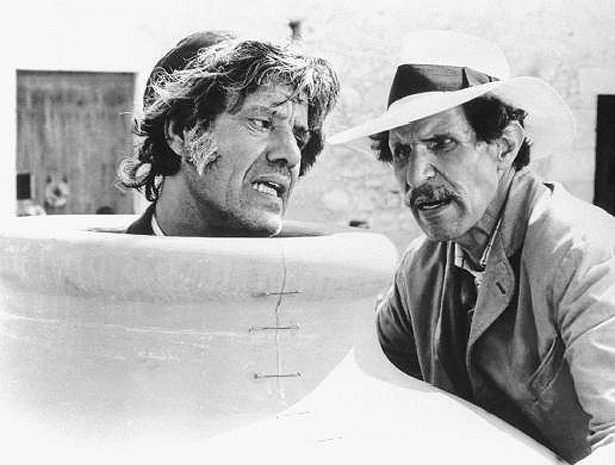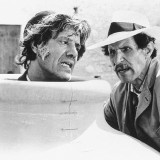With a mysteriously enchanting soundtrack by Nicola Piovani and a black raven donned with a chiming bell flying over the timeless medieval villages perched defiantly on the mountains of Girgenti on the southern coast of Sicily – the brothers Taviani weave together five tales based on novels by 1934 Nobel prize in Literature laureate, Luigi Pirandello.
The film is titled Kaos as it’s the birthplace of Pirandello in this region. The opening quote reveals its seeming duality:
“…Io dunque son figlio del Caos; e non allegoricamente, ma in giusta realtà, perché son nato in una nostra campagna, che trovasi presso ad un intricato bosco, denominato, in forma dialettale, Càvusu dagli abitanti di Girgenti: corruzione dialettale del genuino e antico vocabolo greco Kàos.”
“…Therefore I am son of Chaos; and not allegorically but in true reality because I was born in the countryside, located nearby entangled woods named Càvusu by the inhabitants of Girgenti dialectal: corruption of the genuine and antique Greek name Kàos.”
-Luigi Pirandello
This statement clearly encapsulates Pirandello’s writing style that is also apparent in the film’s five tales showing how the lines between fantasy and reality often blur; words are worthless and reality can be false or true. It all boils down to how different people process information differently. And this information could be textual or visual as each one of us carries his own “survival baggage” of experiences and memories to make quick assessment of the reality in front of us.
Since the film is long (182 minutes), I recommend watching it in installments, savoring each tale to its maximum quality.
 Franco and Ciccio in the third tale: “La Giara – The Jar”
Franco and Ciccio in the third tale: “La Giara – The Jar”
I especially liked the third tale “La Giara – The Jar” which brings an air of classic fable with a comic flair by leveraging Italy’s epic duo Franco and Ciccio. Human greed and power are downplayed in two ways: Don Lolò (Ciccio Ingrassia) acknowledges life’s misleading aspects as he laments about a poor peasant boy passing by with a huge load on his back:
“Look at that kid. He doesn’t have anything, yet he still has 60 years of life ahead of him. And I who have all this, how many years left might I have 15, 20…”
And to underscore this point the role of Zi’ Dima (Franco Franchi) shows us how human shrewdness can overcome Don Lolò’s on paper great resources and power. The Pirandellian message is clear: never believe what you see. It’s up to you to interpret the situation and find your way to meet your truth.
And with such a fine message,
I wish you all a happy and prosperous new year!

